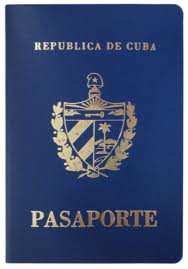 It’s only thirty-two pages in a blue booklet with the shield of the Republic engraved on the cover. This Cuban passport looks more like a safe-conduct than an ID, with it we can escape from insularity though it still doesn’t guarantee we can board an airplane.
It’s only thirty-two pages in a blue booklet with the shield of the Republic engraved on the cover. This Cuban passport looks more like a safe-conduct than an ID, with it we can escape from insularity though it still doesn’t guarantee we can board an airplane.
We live in the only country in the world where acquiring this document to travel requires us to pay in a currency different from that in which they pay our wages. Its cost — fifty-five convertible pesos — means that the average worker must save his entire salary for three full months to be able to buy this filigreed booklet with the numbered pages. What should be a credential that can be obtained for the mere fact of having been born in a given nation, in our country is a privilege for those who have hard currency: the colored notes obtained by doing the exact opposite of what the official discourse tells us to do.
Here, at the beginning of the 21st century, however, it is no longer unusual to meet a Cuban with a passport, something extremely rare in the seventies and eighties. In that era only a select few could display a credential that allowed them to board an airplane and fly to a foreign airport. We became an immobile people, and the few who did managed to travel were either being sent on a foreign mission, or departing into the finality of exile. To cross the barrier of the sea became a prize for those who had climbed the structures of power; the great mass of “unreliables” could not even dream of leaving the archipelago.
Fortunately, that began to change in the nineties. Perhaps it was the huge influx of tourists who infected us with curiosity about what was “outside,” or the fall of the socialist camp, but they could no longer restrict travel to “incentive trips” won only by the most loyal. The truth is, in those years the mechanism for leaving the Island began to loosen. The access to convertible currency, either through remittances from family abroad, or earnings from self-employment or the black market, also encourages us to begin exploring new horizons. Most often this is achieved through the help of a friend or relative living in another country, who pays the excessive cost of the trip. If we depended solely on our own pockets, few would ever manage to board a flight.
It’s true that travel is no longer a prerogative enjoyed only by the elect, but the government maintains an ideological filter to avoid allowing its critics such a succulent gift. There continue to be strong restrictions on leaving and entering the national territory. For those of us inside the country, the padlock is called the “exit permit” and is awarded based on political considerations. Those who have emigrated must endure a similar process that culminates in their acceptance — or not — to re-enter their own homeland as tourists. The final decision on both types of permits is made by a military institution that reserves for itself right to offer no explanations. Thus, the offices in Cuba where one solicits the exit permit — the so-called “white card” — or the Cuban consulates abroad where our exiles must seek approval to return home for a visit, are staging areas for human dramas, where the arbitrary is the order of the day.
Those who express critical opinions, belong to an opposition group, or have dared to engage in the exercise of independent journalism, rarely receive a travel permit. Another tightly controlled sector is those people who work in public health professions, who need a license from the appropriate minister himself, to be able to travel.
The situation takes on dramatic tones among those exiles who have lived abroad for decades, unable to visit their families or see their already grown children. Some die far from home, having never been able to return to kiss the forehead of the mother they left behind, or to take a last look at the house where they were born. A Party, an ideology in power, has claimed the power to regulate our migratory flow, as if the island platform was not home, homeland, refuge, but rather prison, fortress, trench.
For those lucky enough to get their exit permit, then comes the second stage of the ordeal which consists of arriving at the airport abroad and showing the passport that so many look upon with suspicion. The high number of Cubans who, every month, remain illegally in some corner of the terrestrial globe, makes us targets of great skepticism when it comes time to apply for a visa. Thus, when they finally settle in and become citizens of another country, my compatriots breathe a sigh of relief to have a new identification document that gives them a sense of belonging somewhere. A few brief pages, wrapped in a cover with the coat of arms of another nation can make all the difference. Meanwhile, that little blue booklet that says Born in Cuba, remains hidden in a drawer, in the hopes that one day it will be a source of pride, rather than shame.
December 6, 2010
